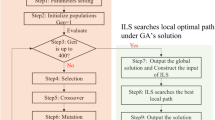Abstract
Product orders are usually released with a cyclic manner, in the part manufacturing industries. Hence, scheduling cyclic jobs instead of single jobs is more practical in the real manufacturing environment. In this paper, a flexible job shop scheduling problem with cyclic jobs is studied. In this problem, jobs must be delivered in determined batch sizes with definite time intervals. This problem is practical for many manufacturing systems such as automotive parts making industries. Whereas jobs are repeating infinitely during time, a framework is suggested to break down the infinite programming horizon to smaller periods. Then a mixed integer linear programming (MILP) model is presented to schedule jobs in this short term horizon. The goal of the proposed model is minimizing the total cost including delay costs, setup costs and holding costs. Since the problem is well-known as NP-hard class, the proposed MILP model is effective just for small size problems. Therefore, two algorithms based on genetic and simulated annealing (SA) algorithms are developed to solve real size problems. The numerical experiments are used to evaluate the performance of the developed algorithms. Results show that the proposed genetic algorithm (GA) has a better performance than the SA algorithm. Also some intelligent approaches are presented and examined in the proposed algorithms. Results show the efficiency of the presented intelligent approaches as mutation operators for the proposed GA.





Similar content being viewed by others
References
Bahroun, Z., Baptiste, P., Campagne, J. P., & Moalla, M. (1999). Production planning and scheduling in the context of cyclic delivery schedules. Computers and Industrial Engineering, 37(1), 3–7.
Brucker, P., & Kampmeyer, T. (2008a). A general model for cyclic machine scheduling problems. Discrete Applied Mathematics, 156(13), 2561–2572.
Brucker, P., & Kampmeyer, T. (2008b). Cyclic job shop scheduling problem with blocking. Journal of Intelligent Manufacturing, 159(1), 161–181.
Cavory, G., Dupas, R., & Goncalves, G. (2005). A genetic approach to solving the problem of cyclic job shop scheduling with linear constraints. European Journal of Operational Research, 161(1), 73–85.
Fattahi, P., SaidiMehrabad, M., & Jolai, F. (2007). Mathematical modeling and heuristic approaches to flexible job shop scheduling problems. Journal of Intelligent Manufacturing, 18(3), 331–342.
Fattahi, P., Jolai, F., & Arkat, J. (2009). Flexible job shop scheduling with overlapping in operations. Applied Mathematical Modeling, 33(7), 3076–3087.
Hanen, C. (1994). Study of a NP-hard cyclic scheduling problem: The recurrent job shop. European Journal of Operational Research, 72(1), 82–101.
Hanen, C., & Munier, A. (1997). Cyclic scheduling on parallel processors: An overview. In P. Chretienne, E. G. Coffman, J. K. Lenstra, & Z. Liu (Eds.), Scheduling theory and its applications. New York: Wiley.
Kacem, I., Hammadi, S., & Borne, P. (2002). Approach by localization and multiobjective evolutionary optimization for flexible job shop scheduling problems. IEEE Transactions on Systems, Man and Cybernetics, Part C, 32(1), 1–13.
Leung, J. (2004). Handbook of scheduling algorithms, models and performance analysis. Boca Raton, FL, USA: CRC Press.
Ouenniche, J., & Bertrand, J. W. M. (2001). The finite horizon economic lot sizing problem in job shops: The multiple cycle approach. International Journal of Production Economics, 74(1), 49–61.
Pezzella, F., Morganti, G., & Ciaschetti, G. (2008). A genetic algorithm for the flexible job shop scheduling problem. Computers and Operations Research, 35(10), 3202–3212.
Romanova, A. A., & Servakh, V. V. (2009). Optimization of processing identical jobs by means of cyclic schedules. Journal of Intelligent Manufacturing, 3(4), 496–504.
Roundy, R. (1992). Cyclic schedules for job shops with identical jobs. Mathematics of Operations Research, 17(4), 842–865.
Song, J.-S., & Lee, T.-E. (1998). Petri net modeling and scheduling for cyclic job shop with blocking. Computers and Industrial Engineering, 34(2), 281–295.
Author information
Authors and Affiliations
Corresponding author
Rights and permissions
About this article
Cite this article
Jalilvand-Nejad, A., Fattahi, P. A mathematical model and genetic algorithm to cyclic flexible job shop scheduling problem. J Intell Manuf 26, 1085–1098 (2015). https://doi.org/10.1007/s10845-013-0841-z
Received:
Accepted:
Published:
Issue Date:
DOI: https://doi.org/10.1007/s10845-013-0841-z




